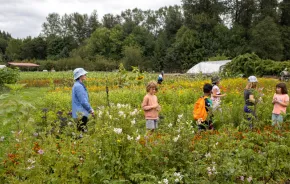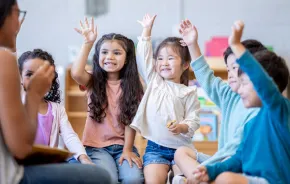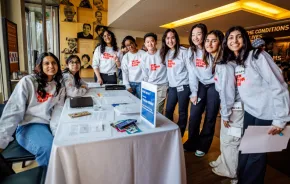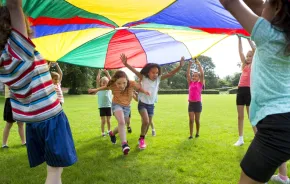Editor’s note: In this nine-month series we will explore how new voluntary standards developed in Washington state are impacting the quality of after-school programs that serve about 134,000 youths after the school bell rings. We will explain what parents should seek in a program, look at research on the impacts of quality care on kids’ development and academics, and visit with programs that are successfully serving kids and helping families. After-school Special’s independently reported content is funded by a journalism grant in partnership with the Raikes Foundation and School’s Out Washington.

Holy Chea grew up in an area of south Tacoma that was marked by poverty and gang activity. And while there were caring adults in his life, “There was an attitude [around the school environment] of ‘Let’s just get the students through,’” Chea says. After-school programs, while offering safe havens, lacked focus on learning or academics, nor was there an expectation of success in school.
Now, as a program associate for the Greater Tacoma Community Foundation (GTCF), Chea is helping to raise the bar for students like the one he once was, kids from a wide variety of cultural backgrounds and economic circumstances. He is part of a movement in Washington state to transform after-school hours from wasted time to engaging programming. For many existing extracurricular programs, that means learning how to better understand kids’ cultural and community framework in order to connect meaningfully with them.
 “When there is staff of color interacting with students [of color], just by physically looking at them, kids can remove that barrier and see staff as role models,” Chea says. “It’s about mentorship, and even respect, where kids will learn, for instance, to shake one another’s hand — things like that that a lot of young men struggle with.”
“When there is staff of color interacting with students [of color], just by physically looking at them, kids can remove that barrier and see staff as role models,” Chea says. “It’s about mentorship, and even respect, where kids will learn, for instance, to shake one another’s hand — things like that that a lot of young men struggle with.”
In 2011, the GTCF partnered with Seattle-based Raikes Foundation on a broad project to help organizations in Washington state implement new standards for after-school programs. Called the Youth Program Quality Initiative (YPQI), the effort offers training and support for organizations that serve students outside of school hours.
The effects spill over far beyond after-school hours.The voluntary standards are divided into nine domains, one of which is “cultural competency and responsiveness.” In programs that are strong in this area, students are encouraged to express their own cultural identity, and administrators hire and develop qualified staff that reflects the diversity and culture(s) of the community being served. One goal is “to get programs to want to meet these standards, aiming high to meet the bar of quality and sustaining it,” says David Bowermaster, a spokesperson for Raikes.
Research by the Afterschool Alliance shows that students who regularly attend high-quality after-school programs are less likely to be involved in teacher-reported misconduct and use drugs and alcohol.
Safe Streets, one of the GTCF’s partner organizations in implementing quality initiatives, turned around the life of a young man named Justin Huey.
On a recent visit to his former school, Washington High School in the Franklin Pierce school district, to talk with this reporter, Huey sat outside the imposing building and spoke of how he nearly didn’t make it out of his junior year.
“I was struggling. I felt like I didn’t have a voice.” With a lot of negative behaviors and choices going on around him, the now 21-year-old says he did not see much of a future for himself. His after-school time was spent hanging out at friends’ houses, at risk of playing into cultural stereotypes and a self-fulfilling prophecy.
But as it turns out, Safe Streets’ Youth Leading Change program, which he began attending two afternoons each week, elevated Huey, drawing out leadership qualities that also positively influenced others at his school.
“When there is staff of color interacting with students [of color], just by physically looking at them, kids can remove that barrier and see staff as role models.”
— Holy Chea
“This was a breath of fresh air, when you’re told, ‘We see you being a leader at your school,’” Huey says. “I found a group of friends that are actual friends, and I realized how much I was missing from my other so-called ‘friends,’ who were going a different direction.”
Now a student at Tacoma Community College, Huey also works as a Starbucks barista, a job that he hopes to parlay into a bachelor’s degree from Arizona State University.
The YMCA of Greater Seattle’s Aaron Norikane oversees five after-school programs at the elementary school level. With younger students, Norikane says, the role modeling and trust with staffers is no less important than with older kids.
“Kids sometimes download if they’ve had a bad day. The staff may problem solve or tackle the issue as a group,” Norikane says. And that is where good after-school programs, whose staffs are trained to be sensitive to kids’ challenges and respond productively to them, can also boost the student’s attitude and performance in the classroom.
Anyone who works with teenagers knows force is not often the best course of action.
Safe Streets’ Hector Farias says that before his group adopted the YPQI during the 2011–2012 school year, “We didn’t understand why we didn’t have big numbers of kids attending our program. But what we learned is that we hadn’t been approaching them in a way where they felt like they belonged.
“Before [the program went through this process], there was a sense of telling [the kids] what to do, that there was only one way. Now there are two ways, us and them, and actually it’s more them since they are the ones taking the lead, making the changes in their schools,” Farias says.
Now, “I feel great because kids come to our program because they want to come.”











